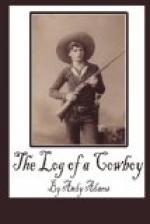It was a nice open country between the Wichita and Pease rivers. On reaching the latter, we found an easy stage of water for crossing, though there was every evidence that the river had been on a recent rise, the debris of a late freshet littering the cutbank, while high-water mark could be easily noticed on the trees along the river bottom. Summer had advanced until the June freshets were to be expected, and for the next month we should be fortunate if our advance was not checked by floods and falling weather. The fortunate stage of the Pease encouraged us, however, to hope that possibly Red River, two days’ drive ahead, would be fordable. The day on which we expected to reach it, Flood set out early to look up the ford which had then been in use but a few years, and which in later days was known as Doan’s Crossing on Red River. Our foreman returned before noon and reported a favorable stage of water for the herd, and a new ferry that had been established for wagons. With this good news, we were determined to put that river behind us in as few hours as possible, for it was a common occurrence that a river which was fordable at night was the reverse by daybreak. McCann was sent ahead with the wagon, but we held the saddle horses with us to serve as leaders in taking the water at the ford.
The cattle were strung out in trailing manner nearly a mile, and on reaching the river near the middle of the afternoon, we took the water without a halt or even a change of horses. This boundary river on the northern border of Texas was a terror to trail drovers, but on our reaching it, it had shallowed down, the flow of water following several small channels. One of these was swimming, with shallow bars intervening between the channels. But the majestic grandeur of the river was apparent on every hand,—with its red, bluff banks, the sediment of its red waters marking the timber along its course, while the driftwood, lodged in trees and high on the banks, indicated what might be expected when she became sportive or angry. That she was merciless was evident, for although this crossing had been in use only a year or two when we forded, yet five graves, one of which was less than ten days made, attested her disregard for human life. It can safely be asserted that at this and lower trail crossings on Red River, the lives of more trail men were lost by drowning than on all other rivers together. Just as we were nearing the river, an unknown horseman from the south overtook our herd. It was evident that he belonged to some through herd and was looking out the crossing. He made himself useful by lending a hand while our herd was fording, and in a brief conversation with Flood, informed him that he was one of the hands with a “Running W” herd, gave the name of Bill Mann as their foreman, the number of cattle they were driving, and reported the herd as due to reach the river the next morning. He wasted little time with us, but recrossed the river, returning to his herd, while we grazed out four or five miles and camped for the night.




